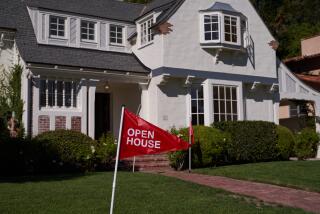Home Sales Decline 2.7% in October
- Share via
WASHINGTON — Sales of previously owned homes fell more than expected in October, a fresh sign that the red-hot housing market is cooling. The decline would have been worse without increased demand from displaced hurricane victims.
Although prices rose at the fastest clip in more than a quarter-century, the number of unsold homes also rose to the highest level in 19 years. Analysts forecast that this backlog will dampen price gains going forward.
The National Assn. of Realtors reported Monday that sales of previously owned homes and condominiums fell by 2.7% in October, more than double the 1.1% decline analysts had expected.
It left sales at a seasonally adjusted annual rate of 7.09 million, down from a sales rate of 7.29 million units in September, which was the second-fastest pace on record.
Economists said the latest report, which showed sales declines in all regions of the country, appeared to be a signal that the booming housing market was beginning to slow because of steadily rising mortgage rates.
“The housing sector has likely passed its peak. The boom is winding down,” said David Lereah, chief economist for the Realtors group. “I expect continued softening in housing if rates remain at these levels or go higher.”
The decline in sales pushed the number of unsold homes to 2.87 million, the highest level in more than 19 years. It would take 4.9 months to deplete that inventory level at the current sales pace.
The median price of a previously owned home sold last month rose by 16.6% to $218,000, compared with October 2004.
Economists predicted that the buildup in unsold homes would help dampen the surge in home prices that saw 69 cities report double-digit gains in prices this summer, compared with the third quarter of 2004.
The sales slowdown was linked to the Federal Reserve’s continued campaign to boost interest rates to combat the threat of higher inflation after the recent surge in energy prices.
The average commitment rate for 30-year mortgages rose to 6.07% in October, up from 5.77% the month before.
Patrick Newport, an economist with Global Insight, an economic research firm in Lexington, Mass., said he expected mortgage rates, which went up by about a half-point in the last 10 weeks, to rise by another half-point in the next six months as the Fed continued to boost short-term interest rates.
“These increases will cool off the housing market and deflate many local housing bubbles without creating a housing crash,” Newport said.
Most analysts believe that housing will cool gradually to more sustainable levels but will escape what happened when the Internet bubble burst in early 2000, wiping out trillions of dollars in paper wealth and helping to push the U.S. economy into a recession.
Lereah said he believed that gains in home prices would slow to around 5% in 2006.
More to Read
Inside the business of entertainment
The Wide Shot brings you news, analysis and insights on everything from streaming wars to production — and what it all means for the future.
You may occasionally receive promotional content from the Los Angeles Times.









